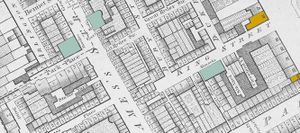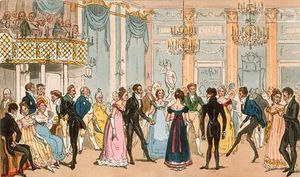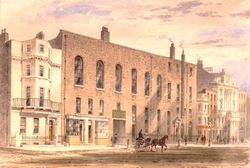Almack's Assembly Halls
Almack's Assembly Rooms, also known as simply 'Almack's', was a social club on King Street in the St James area of London. It was among the very limited number of mixed-sex venues for the upper classes, and held balls every Wednesday evening. It is located just around the corner from Brooks's and Boodle's and a few minutes' walk from White's, the gentlemen's clubs along St James' Street.

Entry Requirements
Entry to Almack's was by voucher only, at a cost of ten guineas each, and only those who had been presented at Court (or who, during the years when Court presentations were suspended, would have been presented) were eligible for vouchers, which were issued for a month at a time. If you did not have vouchers, that might simply mean that you had not applied for them, but if you had held them and had lost the privilege of buying them again, that meant that you had been found wanting - to lose one's vouchers was considered a disaster for those whose position in Society meant everything.
The doors were closed to new arrivals from eleven PM and if you had not arrived by then, you were not allowed in.
The dress code was very strict: Evening gowns and long gloves for the ladies and stockings, breeches, waistcoats, evening coats and gloves for the gentlemen. In 1814, the Duke of Wellington, the hero of the hour, was forbidden entry to Almack's when he arrived in trousers.
The Lady Patronesses

Almack's was governed by a select committee of highly influential ladies, who came to be known as the Patronesses, or Lady Patronesses. There were six or seven of these formidable ladies at any one time, and they were the final arbiters on who could and who could not purchase the vouchers required for entry to the Wednesday evening balls (the only events of any note that the club held).
The Lady Patronesses' tastes when it came to dancing were conservative. Gentlemen were expected to dance, and unlike a private ball or informal family gathering, no partners of the same sex were allowed. Dances were limited to country dances and the waltz and quadrille were not danced at Almack's until quite late on - the dates are variously given as 1813, 1815 and 1816.
The Lady Patronesses were:
- Amelia Stewart, Viscountess Castlereagh
- Sarah Villiers, Countess of Jersey, who should not be confused with her mother-in-law, Frances Villiers, Countess of Jersey, one of the more notorious mistresses of George IV when he was Prince of Wales.
- Emily Lamb, Lady Cowper, sister of the Prime Minister Lord Melbourne, and later married to another Prime Minister, Lord Palmerston.
- Maria Molyneux, Countess of Sefton, wife of William Molyneux, 2nd Earl of Sefton.
- The Hon. Sarah Clementina Drummond-Burrell, later Lady Willoughby de Eresby. Clementina was the only surviving child of James Drummond, 1st Baron Perth. On marriage, her husband Peter Burrell, a noted dandy, assumed the Drummond family name. He succeeded his father as 2nd Baron Gwydyr.
- Dorothea Lieven, Countess de Lieven, wife of the Russian ambassador and a political force in her own right. (She became Princess Lieven only in 1825)
- Countess Esterházy, wife of the Austrian ambassador Prince Paul Anton Esterházy. (She became Princess Esterházy in 1833)
Refreshments
Refreshments were limited to thinly sliced bread with butter and dry cake, meaning without icing, not stale as modern sensibility has it. The only drinks served in the supper rooms were tea, lemonade, claret-cup (claret mixed with soda, fruit juice and sugar, occasionally also with brandy mixed in ) and orgeat (distilled from barley or almonds with orange flower water, considered to be a light refreshing drink), in order to avoid drunkenness and the rowdy behaviour that results. This was in order not to resemble private balls at which the suppers could be extremely lavish.
Notable events at Almacks
See Also
Jane Austen's World: Almack's Assembly Rooms and its Snobbish Patronesses
In Search of Almacks
Almack's on Wikipedia
